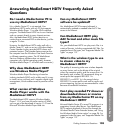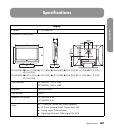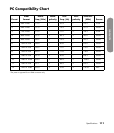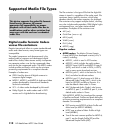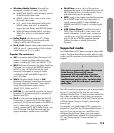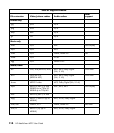
Specifications
Specifications 113
! Windows Media Codecs. Microsoft has
developed a number of codecs, including:
! WMV7 and WMV8, which are early versions
of the Microsoft video codec.
! WMV9, which is the current version of the
Microsoft video codec.
! VC-1, which is the Advanced Profile of the
WMV9 codec, and which is needed for
support by both Blu-ray and HD-DVD players.
! WMA (Windows Media Audio), including
WMA Pro, which is a multichannel audio
codec.
! Dolby Digital. Also known as AC3, Dolby
Digital forms the basis of multichannel audio
coding in HDTV and DVD movies.
! DivX, Xvid. Popular video codecs based on the
MPEG-4, part 2, video standard. DivX includes
video codecs rev. 3, 4, 5, and 6.
Popular file containers
! AVI is a popular Audio/Video file format in PC
systems. It supports multiple audio and video
codecs, including DV, DivX, and MPEG-1/2/4.
! MP4 file format is based on the Apple QuickTime
file format, but is part of the MPEG-4 standard
(MPEG-4, part 14). MP4 files use the .mp4
extension and support a variety of codecs,
including the AAC and MPEG-4 (part 2 or
part 10) codecs.
! WMV (Windows Media Video) or ASF
(Advanced Streaming Format) are also popular
Microsoft media file containers. They support
mostly Microsoft-based codecs such as
WMV7/8/9, WMA, and VC-1.
! DVR-MS is a Microsoft file container for storing
broadcast TV programming that is recorded by
Media Center PCs.
! DivX is a file container developed by the DivX
Corporation. It supports the DivX video codecs
(versions 3.0 to 6) that are based on the MPEG-4,
part 2, video codec, and a variety of audio
codecs, including MP2, MP3, Dolby Digital, and
raw LPCM data. The divX file format can also
support metadata, subtitle tracks, and DRM.
! QuickTime (.mov or .qt) is a file container
developed by Apple. It provided the basis for the
MP4 file format that is currently used by iTunes
and other media service providers.
! MPG (.mpg) is the simplest possible file container
for an MPEG video with associated audio. It
usually supports MPEG-2 video (MP@ML or
MP@HL) and MPEG-2, Layer II, or Dolby Digital
audio.
! VOB (Video Object) (.vob) files are used in
DVDs. They include audio, video, menu, and
subtitle information. In most cases, renaming a
.vob file to an .mpg file is all that is needed to
play the file by an MPEG-compliant decoder
(without the menu or subtitle information,
however).
Supported media
Your MediaSmart HDTV does not support all possible
codecs. The table that follows provides details on the
codecs and file containers that the MediaSmart HDTV
supports.
The UPnP-compliant program you use to stream media
to your TV can limit the files that you can stream.
Windows Media Player 11 does not show media files
that it does not support or that it does not recognize
such as iTunes audio files in MP4 (AAC) format, photos
in Bitmap format (.bmp) or Graphics Interchange
Format (.gif).
For example, your MediaSmart HDTV supports the
playback of .mp4 files, but Windows Media Player 11
may not. If you do not see your .mp4 files in the
Windows Media Player Library, you may need to
install the MediaSmart software from the Installation
CD; see “Setting up the TV home network” on
page 27.
!
This device supports the codec file formats
listed herein, however HP cannot
guarantee full compatibility or proper
playback with all such codec files due to
modifications and/or other variation that
may occur with the end-user’s endcoded
codec files.



